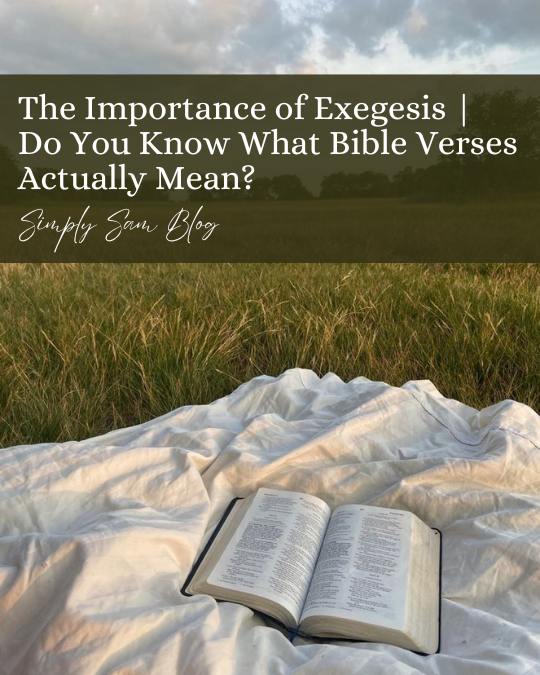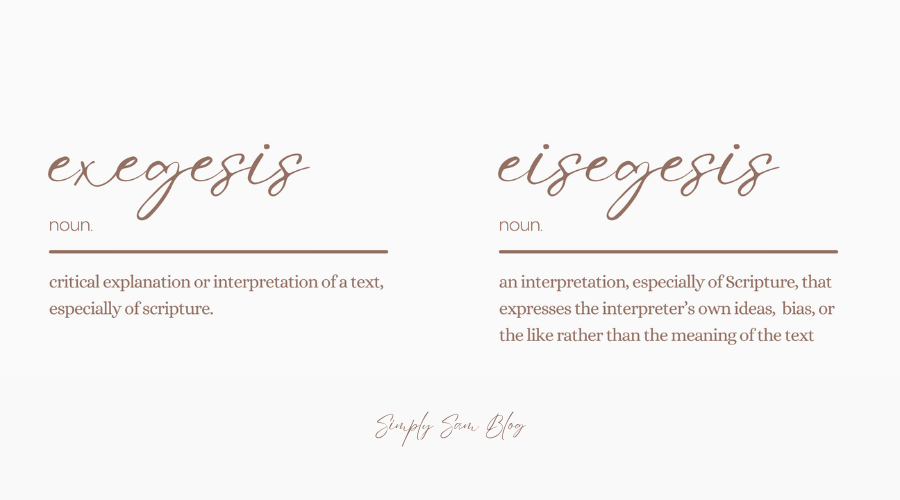We’ve all been there. We read a verse at face value and come to a seemingly obvious conclusion about what it means. Only to find out later that someone else believes it’s saying something else. How do we know which interpretation is correct? That’s where exegesis comes in. Read on to find out the importance of exegesis and why it’s so easy to misinterpret Scripture on our own.

I’ve recently been diving deeper into the study of Calvinism vs. Arminianism. If you’re not familiar, they’re basically two soteriological camps within the Christian faith. Essentially what that means is that they study salvation. What is is, how it happens, and what the Bible says about it.
My view on this issue isn’t necessary to the main point of this post. However, I’m going to share it and a little bit of background as to how I landed on my position because I feel it is fairly relevant and can be used as an example.
my soteriological view
I believe that Calvinism is Biblical and that its “Doctrines of Grace” best describe salvation as it’s seen in the Bible.
That’s not a popular view to hold. So if you disagree with me, you’re not alone haha. But I do want to preface by saying that I didn’t come to this conclusion overnight or because someone told me to believe it. Throughout my entire life, my idea of God and salvation closely resembled that which Arminianism describes. Respectfully, I blame that on the shallow theology and topical preaching of most modern American churches.
*I’m not saying that all people who consider themselves Arminian have a shallow theology. However, that’s simply what led me to that point. Not that Calvinism is deeper theologically, but that diving deeper myself caused me to lean that way. For others, the opposite may be true.*
I didn’t have much of a theology background and I didn’t really think it mattered. Quite frankly, I didn’t see the importance of diving any deeper into theology because I thought it was too complicated. And I certainly didn’t see the importance of learning about secondary theological issues.
when everything changed for me
That all changed in college. I had to take a theology class for one of my elective credits since I went to a Christian university. That was the first time I was ever really introduced to theology. I realized there was so much more to the Bible, especially to God, than I had ever known.
It sparked a desire in me to dig deeper. To stop just simply reading the Bible. To stop doing fluffy devotionals that put the focus on me instead of on God. I wanted to learn more about God and more about the Bible so that I could better understand who He was and what His word actually meant, not just what I thought it meant.
I realized that both of those things- God’s nature and the Bible- were a lot more complex than I had always thought they were.
So I started trying to dive deeper into these studies on my own even after I was done with the class. I started learning that a lot of the things I had previously thought were true about God and the gospel weren’t actually what the Bible taught. I became very surprised after reading this book by R.C. Sproul (highly recommend it by the way!) that I actually agreed with Calvinistic doctrines more than Arminian doctrines.
I had this picture in my head that Calvinists were evil. And I especially thought that the “god” they described was evil and could absolutely not be the God of the Bible. But once I actually dove into Scripture myself and understood more of the depth of it, I couldn’t help but notice that Calvinism was actually Biblically-sound. At least from what I could tell based on my studies.
my current studies
I’m currently diving deeper into the debate between the two camps because I want to better understand both sides. And even more so, I want to have a good defense for what I believe. Especially since Calvinism is so hated and misunderstood.
So, part of that has been watching a lot of videos of people arguing against Calvinism. I came across this one the other day, and had some thoughts, so I wanted to make a post in response. It’s just a YouTube Short, so go watch it before you read my “rebuttal.”
my response to the video
There are several things I disagree with in this video. Firstly, I know of a lot of people who came to Calvinism just by reading the Bible. Some of whom hadn’t even heard the word “Calvinism” until people negatively accused them of being one.
Secondly, I don’t think it’s necessarily a bad thing that R.C. Sproul didn’t like Calvinism at first. I’m going to talk about this point more in depth another time. But for now, all I’ll say is that I think many people are opposed to Calvinism because it sounds offensive. At least at first until you fully understand the doctrines. It’s not at all similar to the idea that a lot of us grew up learning about God and the gospel. The idea that God loves everyone and accepts them, sin and all.
Calvinism demands that you recognize the fact that God isn’t just loving and graceful. But that He’s also just and full of wrath. That can be hard to accept (and even like) if you grew up in a typical “fluffy” American church. We want to see Him as a loving God, but that’s not all He is. The loving God of the New Testament, is also the wrathful God of the Old Testament.
Both love and wrath are characteristics of God, and both of those characteristics are good because God is good.
And lastly, learning from others, and even changing your theological stance on something because of something someone else said, doesn’t make that thing any less true than if you were to simply come to the conclusion yourself in the Bible. And that (finally) brings me to the whole point of this post.
sola scriptura?
Protestant theology, and therefore the majority of American churches, hold to Sola Scriptura. What does that mean? It means that Scripture alone is sufficient. The Bible is our sole, infallible source of authority when it comes to the Christian faith.
Because of this “sola,” many Christians seem to think that we can’t look anywhere except to the Bible for truth and understanding. In an attempt to put Scripture above tradition, many Protestants have completely cut out tradition, theology, and Biblical commentary. I think that doing that puts you on a dangerous path. Let me explain why.
While we are to look to Scripture ourselves for truth, understanding, and knowledge about God and the gospel, we also need to understand it. The Bible isn’t surface level. There’s a lot more to it than the words we read.
context matters & the importance of exegesis
One of the most important things in understanding the Bible is understanding its context. In order to understand what a verse means, we need to know its context. And by context, I don’t just mean the verses around it, although that’s also a huge part of it. It’s easy to take a verse on its own and use it to defend almost anything. However, if you go and look at the whole chapter, you’ll find that a lot of the time, the verse was talking about something completely different.
By context, I also mean these things: who it was written by, who it was written to, why the book was written, and the original language. This is where exegesis comes in as opposed to eisegesis.

who wrote it
Knowing who wrote the book can help us to better understand what is meant by any particular verse. Each writer of the Bible has their own specific writing style. If we are unsure of what a certain passage means, sometimes the writer’s style can clue us in to something. We can look to other books that he wrote to see if there are similar wordings that are a little bit clearer to understand.
who is it written to
This one is huge. Who is the book’s intended audience? Is it written to a certain culture? To a certain person? Are the people in the audience already Christians? Knowing these things can help us tremendously in understanding what certain passages mean.
Knowing who it is written to can help us to understand certain cultural contexts. There may be things that the author wrote without much further explanation since the people he was writing to would’ve understood it culturally. However, if we don’t have a good understanding of Corinthian culture, for example, we may not understand something in Paul’s writing that was obvious to the Corinthians.
why was it written
Why a book was written is also very helpful because it can clue us in to what a certain verse is talking about if it is unclear on its own. For example, Paul’s letters are written to specific people or “towns” for specific reasons. For the most part, he’s writing everything in the letter in regards to a specific issue. Knowing the issue he’s writing about can help us to understand what verses mean. One verse may sound like it could apply to another issue, but if it was really intended to describe something completely different, we need to be careful with how we use it.
what is the original language
This is another huge one. It’s very important to know what the original words in Hebrew or Greek were when contemplating the meaning of a verse. Sometimes, we don’t have a word in English that means exactly what the original word meant. Or, just like in English, the original word can mean several different things. Knowing the original word that was used can help tremendously when we have questions about what a passage means.
One of the most well-known cases of this involves the word “love.” There are four types of love the Bible talks about: agape, eros, phileo, and storge. Because we talk about all forms of love with the same word (“love”) in the English language, all four of these are translated as such. However, each of them have a completely different meaning in the original language. If we didn’t know the original language of a verse with “love” in it, we might interpret it differently than it was meant to be interpreted.
In order to get a word for word translation, I use the ESV translation. The NASB is another good word-for-word translation. This is in comparison to translations like the NIV or The Message that are thought-for-thought translations. I prefer word-for-word because it better ensures that the original meaning remains.
so, how do we come to know all this?
The only way we can really know all of these things is through commentary, interpretations, and sermons from other people. Namely, Biblical scholars, theologians, and qualified pastors. These people are educated in all of these different things. They have a much better understanding of all the different contexts and original languages than we do.
Now, that doesn’t mean that we can’t come to a good understanding of Scripture on our own. Of course we can. But I think we only can to a certain extent. Like I said earlier, there is a lot more to the Bible than what we read at face value. We need to know all those other things to get a good understanding, and we can know those things through the studies of other people who have more knowledge about those things in general.
So, all that to say, just because we learn from someone else doesn’t mean we are putting them above Scripture. A lot of the time it takes insight from others to truly understand what verses mean. And that’s okay. That doesn’t mean we don’t value Scripture itself. If anything, I think it means we value it so much that we want to have a proper understanding of it.
scripture is still your authority
One thing I will say is that Scripture should still be your authority. Everything you read or learn from someone else should be compared to Scripture. If it’s obvious that Scripture says something totally different than what someone says (no matter how educated they are), you should always side with Scripture.
Similarly, it’s important to take people’s biases into account. We all have them, and a lot of the time it’s hard to interpret something without them getting in the way. What I like to do if there are two interpretations of a verse is to compare both with the rest of Scripture. Which seems to align more with what the rest of the Bible says concerning similar issues? Sometimes it’s not totally obvious and that’s why there can be so many interpretations.
what does this all have to do with the video?
So, let’s go back to that video really quickly. He finds an issue in the fact that R.C. Sproul (and most Calvinists) only come to Calvinism after learning from someone else, not from simply reading Scripture. I disagree with that because I don’t think that coming to a conclusion by yourself through Scripture means that it is a correct conclusion.
We all have presuppositions when we read Scripture. Therefore, we can all read the same verse and come to a number of different conclusions, each person thinking theirs is the correct one. This is why we have so many denominations and doctrines throughout Protestantism.
However, we know that there can only be one true interpretation. The only way we can find out what that is is through exegesis. Understanding what a verse actually means instead of what we think it means based off our own understanding. We will always apply our own presuppositions and cultural understanding to a verse if all we do is read the Bible on our own. But Scripture has its own meaning apart from what we understand it to mean based on those things. And that’s what we need to figure out through exegesis.
our presuppositions affect our interpretations
Since most American churches seem to lean towards Arminianism, a lot of us grew up reading Scripture through an Arminian lens. Therefore, we were blinded to the other side. We didn’t know how it could mean anything else until we heard someone else interpret it in a different way, thought about it, and then realized that it actually made quite a bit of sense.
Just because the Calvinistic interpretation was introduced to some people by a pastor, theologian or scholar, doesn’t mean it is less true than a conclusion that someone else comes to on their own.
While we are capable of understanding Scripture, it often takes more than us simply reading a verse to understand what it actually means. But, don’t get me wrong, I’m not at all accusing non-Calvinists of not understanding what verses actually mean. That video just sparked these thoughts in my head. It’s more about his apparent issue of people learning from other Christians than it is about the Calvinist vs. Arminian debate. If you lean towards Arminiansm, that’s totally fine, as long as you’ve studied what the verses actually mean instead of basing your conclusion on what you think they mean or feel like they mean. If that’s how we come to the conclusion on either side, then we need to do more studying.
